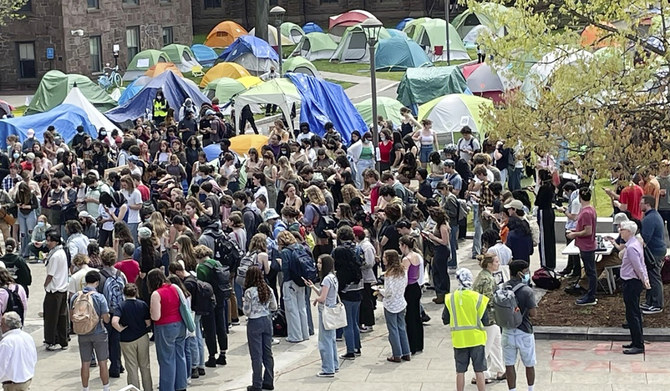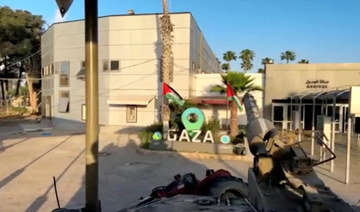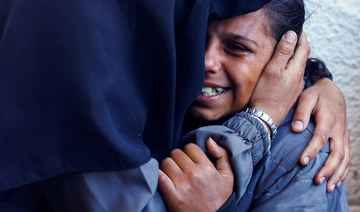CHICAGO: Police cleared a pro-Palestinian tent encampment at the University of Chicago on Tuesday after administrators who had initially adopted a permissive approach said the protest had crossed a line and caused growing concerns about safety.
University President Paul Alivizatos acknowledged the school’s role as a protector of freedom of speech after officers in riot gear blocked access to the school’s Quad but also took an enough-is-enough stance.
“The university remains a place where dissenting voices have many avenues to express themselves, but we cannot enable an environment where the expression of some dominates and disrupts the healthy functioning of the community for the rest,” Alivizatos wrote in a message to the university community.
Tensions have continued to ratchet up in standoffs with protesters on campuses across the US — and increasingly, in Europe — nearly three weeks into a movement launched by a protest at Columbia University. Some colleges cracked down immediately on protests against the Israel-Hamas war. Among those that have tolerated the tent encampments, some have begun to lose patience and call in police over concerns about disruptions to campus life, safety and the involvement of nonstudents.
Since April 18, just over 2,600 people have been arrested on 50 campuses, figures based on AP reporting and statements from universities and law enforcement agencies.
But not all schools are taking that approach, with some letting protesters hold rallies and organize their encampments as they see fit.
The president of Wesleyan University, a liberal arts school in Connecticut, has commended the on-campus demonstration — which includes a pro-Palestinian tent encampment — as an act of political expression. The camp there has grown from about 20 tents a week ago to more than 100.
“The protesters’ cause is important — bringing attention to the killing of innocent people,” university President Michael Roth wrote to the campus community Thursday. “And we continue to make space for them to do so, as long as that space is not disruptive to campus operations.”
The Rhode Island School of Design, where students started occupying a building Monday, affirms students’ rights to freedom of speech and peaceful assembly and supports all members of the community, a spokesperson said. The school said President Crystal Williams spent more than five hours with the protesters that evening discussing their demands.
On Tuesday the school announced it was relocating classes that were scheduled to take place in the building. It was covered with posters reading “Free Palestine” and “Let Gaza Live,” and dove was drawn in colored chalk on the sidewalk.
Campuses have tried tactics from appeasement to threats of disciplinary action to resolve the protests and clear the way for commencements.
At the University of Chicago, hundreds of protesters gathered for at least eight days until administrators warned them Friday to leave or face removal. On Tuesday, law enforcement dismantled the encampment.
Officers later picked up a barricade erected to keep protesters out of the Quad and moved it toward the demonstrators, some of whom chanted, “Up, up with liberation. Down, down with occupation!” Police and protesters pushed back and forth along the barricade as the officers moved to reestablish control.
Officials at the University of North Carolina, Chapel Hill, told deans and department chairs Monday that some students have been informed by instructors opposing the suspension of student protesters that they will withhold grades.
The school provost’s office said it will support “sanctions for any instructor who is found to have improperly withheld grades.”
At the Massachusetts Institute of Technology, protesters were given a deadline to voluntarily leave or face suspension. Many left, according to an MIT spokesperson, who said protesters breached fencing after the arrival of demonstrators from outside the university. On Monday night, dozens remained at the encampment in a calmer atmosphere.
MIT officials said the following day that dozens of interim suspensions and discipline committee referrals were in process, actions taken to ensure the “safety of our community.”
Sam Ihns, a graduate student studying mechanical engineering and a member of MIT Jews for a Ceasefire, said the group has been there for two weeks and is calling for an end to the killing in Gaza.
“Specifically, our encampment is protesting MIT’s direct research ties to the Israeli Ministry of Defense,” he said.
Many protesters want schools to divest from companies that do business with Israel or otherwise contribute to the war effort. Others simply want to call attention to the deaths in Gaza and for the war to end.
Wesleyan senior Uday Narayanan said students there are prepared to protest through the summer if that’s what it takes for their demands to be met.
“Our tuition dollars are still going toward the brutalization of Palestinians,” the 21-year-old physics major said. “So, ultimately, even though our president has said, ‘Oh, I’m not going to call the cops. Oh, I’m not going to beat up students,’ that’s still not enough, and that’s not the bare minimum for us.”
And as Wesleyan’s May 26 commencement approaches, some protesters fear they will be forcibly removed from the center of campus, adjacent to the field where the ceremony is to take place.
“The longer we are here, the more that their facade of laid back, hands off is falling away,” said Batya Kline, a 22-year-old graduate student. “We know that the university does not want us here, and we know that they can change their pace at the drop of a hat without letting us know.”
Frank Straub, senior director of violence prevention at nonprofit advocacy organization Safe and Sound Schools, said these and past protests have shown the need for early dialogue among the university, police and protesters to establish ground rules.
Straub said Wesleyan, for example, needs to have conversations about commencement and where protesters can be, and should make sure a plan is in place to respond, should protesters want to get arrested, so that can be done without violence.
“By their nature, protests are adversarial, but I think we can have controlled adversity,” he added. “And I think the more campus officials are engaged with the protesters and the more police are included in those conversations, that’s critically important.”
The protests stem from the conflict that started Oct. 7 when Hamas militants attacked southern Israel, killing about 1,200 people, mostly civilians, and taking roughly 250 hostages.
Vowing to destroy Hamas, Israel launched an offensive in Gaza that has killed more than 34,500 Palestinians, about two-thirds of them women and children, according to the Health Ministry in the Hamas-ruled territory. Israeli strikes have devastated the enclave and displaced most of its inhabitants.

























